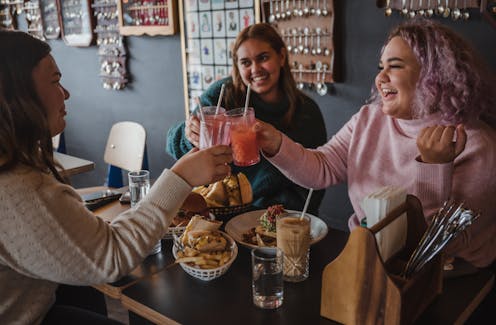7 ways to look after yourself and your community before and after the Voice referendum
- Written by Jacob Prehn, Associate Dean Indigenous College of Arts, Law, and Education; Senior Lecturer - Indigenous Fellow, Social Work, University of Tasmania

The lead-up to the Voice referendum is already affecting[1] the health and wellbeing of Aboriginal and Torres Strait Islander people. These impacts will likely worsen during and after the vote.
A quick search of any social media platform about the Voice referendum reveals a range of strong perspectives on voting “yes” or “no”. But in the loosely regulated[2] world of social and news media, many conversations are becoming toxic and racist, and turning into hate speech[3].
Aboriginal and Torres Strait Islander people are already disproportionately affected[4] by mental ill health, including hospitalisations and troubling rates[5] of suicide. This is why we must take extra care and adopt strategies to support Indigenous Australians and each other.
The issues hate speech bring
Research[6] following the marriage equality postal survey in 2017 found the intense public debates and media messaging had negatively affected the mental health of LGBTIQ+ communities. As we approach the Voice referendum it’s imperative we learn from this.
Aboriginal and Torres Strait Islander people experience worse[7] health and wellbeing outcomes than non-Indigenous people in Australia. A government health performance summary report[8], released in July, revealed about one-third of Aboriginal and Torres Strait Islander people experience elevated levels of psychological distress.
Read more: How we can avoid political misinformation in the lead-up to the Voice referendum[9]
For Aboriginal and Torres Strait Islander people to achieve equity with non-Indigenous Australians on measures such as life expectancy, education and income, there needs to be systemic change. This type of change would likely include constitutional amendments, legislative revisions, the establishment of treaties, embracing truth-telling and other significant measures.
Undoubtedly, such transformative steps would spark national discussion and debate. Discussion is important to fostering understanding and driving progress in society. The problem lies in the politicisation of debate about marginalised people and the amplifying effect on their psychological distress and mental health. This should be a pressing concern for all Australians.
Aboriginal and Torres Strait Islander leadership in mental health during the Voice referendum is crucial. Dr Clinton Schultz, a Gamilaroi man, for example, is leading work with the Black Dog Institute[10] to encourage respectful conversations and protect the wellbeing of Indigenous people.
The federal government has also contributed through the “Take care of yourself and your mob[11]” initiative.
6) Spend time on Country and practice Indigenous culture
Spend time on Country[17] in your favourite place, undertake cultural practices[18] and invite others to join you. If you are non-Indigenous, seek out opportunities to deepen cross-cultural connection, understanding and appreciation by participating in Indigenous cultural practices.
7) Know the signs and seek help
Emotional distress and triggers can arise unexpectedly. Recognise the signs[19] within yourself and among Aboriginal and Torres Strait Islander people around you. If you or anyone else is feeling unwell, we suggest moving away from the cause, spending time with people and places that bring you peace, and if needed seeking help[20].
Read more: How hate speech during the Voice campaign can harm personal wellbeing, as well as democracy[21]
The enduring resilience shown by Aboriginal and Torres Strait Islander people is deep, but not inexhaustible. All Australians should make caring for each other a focus in these complex and challenging times.
If you are experiencing distress, there are First Nations-led resources available:
References
- ^ affecting (www.theguardian.com)
- ^ loosely regulated (www.theguardian.com)
- ^ hate speech (www.sbs.com.au)
- ^ disproportionately affected (www.indigenoushpf.gov.au)
- ^ troubling rates (www.aihw.gov.au)
- ^ Research (www.tandfonline.com)
- ^ worse (www.health.gov.au)
- ^ A government health performance summary report (indigenoushpf.gov.au)
- ^ How we can avoid political misinformation in the lead-up to the Voice referendum (theconversation.com)
- ^ Black Dog Institute (www.blackdoginstitute.org.au)
- ^ Take care of yourself and your mob (www.health.gov.au)
- ^ GettyImages (www.gettyimages.com.au)
- ^ seven strategies of self-care for Indigenous Australians (www.researchgate.net)
- ^ surge (www.abc.net.au)
- ^ Social isolation can take a toll on health and wellbeing (www.sciencedirect.com)
- ^ GettyImages (www.gettyimages.com.au)
- ^ Spend time on Country (www.lowitja.org.au)
- ^ undertake cultural practices (openresearch-repository.anu.edu.au)
- ^ signs (theconversation.com)
- ^ seeking help (www.13yarn.org.au)
- ^ How hate speech during the Voice campaign can harm personal wellbeing, as well as democracy (theconversation.com)

















